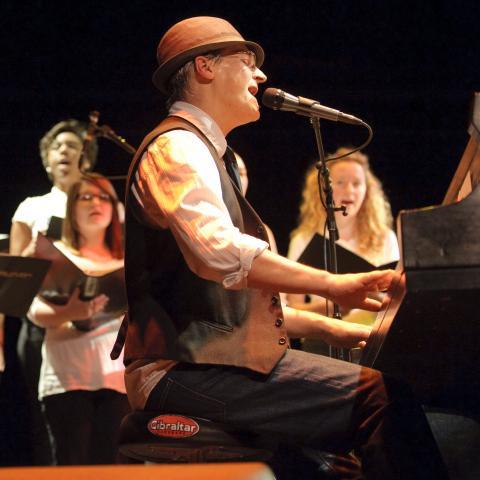This post appears courtesy of New Market Wilm, who features a new blog about Downtown Wilmington each and every Wednesday! View the original post here.
“Wilmington’s Music Man.” That’s what The News Journal once dubbed Joe Trainor, and he’s earned the title. He’s a singer, a band leader, a music director, and a keyboardist with an armful of local music awards to prove his chops. A familiar face on Market, his Rock Orchestra is now knee-deep in rehearsals for a salute to Peter Gabriel on May 12 at The Queen.
In our conversation with Joe, he talked about three moments that made him into the music man he is today.
“When I started out playing in cover bands in the early ‘90s, I knew it was highly unlikely that I was ever going to ‘make it.’ Because I’m an idiot, I wanted to do prog rock. Don’t laugh. I was a big fan of Genesis and Yes and Rush and Jethro Tull. But I knew that style of music was not running up the charts and the possibility of playing the Spectrum was slim. I was never going to get rich making music my way. So what I strove for was respect, and becoming synonymous with the local music scene. And in my 20s, that sounder loftier than being a rock star.”
Getting owned
“I think every musician wants to impress other musicians. Those guys who get up at the blues jams, they want to own the person who played before them.”
“I think the first time it happened to me, I was 19. I had a band, an original band. We were never going to go anywhere. We went into the studio to record a track and the drummer of my band at the time was a guy named Steve Long. His brother is Dan Long, from the band Montana Wildaxe. Someone said, ‘Do you mind if Dan comes in and plays some keys on this?’ And I’m like, ‘Sure, of course, fine.’ I was singing, so it wasn’t like I was giving up my only role on the track. And he comes in and plays this solo and it smoked me. He had chops that I didn’t have back then.”
“So I really buckled down and learned to solo better and learned to play better. And to this day, Dan is a far better keyboard player than I’ll ever be, but now I have Dan playing in our Peter Gabriel show. Dan and I were friends then, but we’re even closer now, but Dan doesn’t know how that moment shaped me as a musician. I’ve never talked to him about it.”
Getting a job
“I was working at Citibank when I was offered the opportunity to come and teach at a school that The Grand Opera House was just starting, in September 2000. Without The Grand, I wouldn’t have met half the musicians that I met. It all spawned from that choice.”
“Tom Shade was running City Theater Company at the time out of an office at The Grand and told him I was interested in maybe being a part of what they were doing, because one of the shows I’ve always wanted to do is ‘Jesus Christ Superstar.’ He put me in touch with the Wilmington Drama League where they were looking for a pit band for their production of ‘Superstar.’ I played that show in January 2003. We were literally stuffed under the stage. We couldn’t even watch the show, but our Jesus was Rory Donavan, who was in the production that was on TV the other night. So it was very cool to see him as one of the apostles on TV.”
“That was a real catalyst for me. I met all of these other musicians, and the ball started rolling. I used those guys in my first production of Pink Floyd’s ‘The Wall,’ which we’ve done at several venues over the course of the next 14 years.”
Getting a reputation
“’Queen at The Queen’ was the first time I really dove into being a music director for a concert. We did more than two hours of music from Queen’s entire career. We used six signers for the first half of the show, and then we brought on a 30-piece choir for the bigger numbers. There was so much energy in that room. Every show that I do, I’m pinching myself the entire time. I don’t know how I got lucky enough to be able to do what I do.”
“This was the first show where I was working with charts and scheduling and really pulling it together. There must have been 30 rehearsals for that show – it was a ridiculous amount of rehearsing. And to sit in a choir room with 30 people and to hear ‘Bohemian Rhapsody’ without the instruments, just the piano and those voices – this is why people make music. Because this is amazing.”
“It would be hard to ignore the impact of singing ‘Bohemian Rhapsody’ on that stage. Musicians have an ego. I’m not immune to that. But that was the moment I realized that I had done what I wanted to do 20 years earlier, that I’d put myself in a position where I’d gained the trust of the musicians and the audience to allow us to get to that moment. So I’m standing center stage and I have 40 people behind me and 800 people in front of me, all singing one of the best songs that have ever been written, and my head is going to explode. It was almost unbearable in the moment.”




